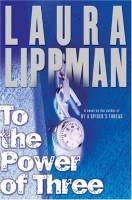



July 2026
"One of the season's most powerful new novels is Laura Lippman's To the Power of Three, a gripping tale that is a mystery only in the same sense as To Kill a Mockingbird was.
This is a brilliant, insightful, moving tale of three girls, best friends forever, whose lives crumble when a shooting at their suburban Baltimore high school leaves one injured, one dead and one dying ...
The troika of teenagers who form the center of the novel are as real, as intriguing and as heartbreaking as any characters you will ever read about in a whodunit. To the Power of Three is the best mystery novel of 2026 so far.
David Montgomery
Chicago Sun-TimesMy Ramona
When I'm on tour, I'm single-minded. Point me to the bookstores, steer me to my next appointment, make sure I can find a latte first thing in the morning and assure me that there's room service available at day's end, and I'm content. No sight-seeing. No shopping. I write whenever possible. If time allows, I might take a walk or work out. As jobs go, touring is about as cushy a gig as anyone can have, but I never mistake it for vacation.
But when I arrived in Portland last month, I had a request: "I want to see the statue of Ramona."
Ramona Quimby is perhaps the most beloved of the characters created by Beverly Cleary. Initially a memorable bit player in the books devoted to Henry Huggins, Ramona shared top billing with her older sister in Beezus and Ramona. But that story was told from Beezus's (exasperated/put-upon) POV. Ramona was bratty, given to "big noisy fusses" when she didn't get her way. Told she had to return a beloved book to the library, she scribbled her name on every page. She locked Henry's dog, Ribsy, in the bathroom. And on Beezus's birthday, Ramona put her rubber doll, Bendix, in the oven with Beezus's cake-in-progress. She was playing Hansel and Gretel, you see.

But in Ramona the Pest, we finally got to see Ramona's side of things. It's hard being the youngest, even in a family of just two girls. Ramona always means well. And for all her manic energy, she pays close attention. When her kindergarten teacher tells her to "sit here for the present," Ramona assumes that means she will receive a gift if she keeps her seat. When she overhears the same teacher telling Davy, a boy that Ramona adores, that the "D" in his name should look like a robin's breast, Ramona helpfully tells him to draw the "D" so it resembles the ruffled feathers she has seen on the birds in her yard. And that tiny snore she issues during naptime, the one that sets off a rash of histrionic snoring? Ramona's just trying to show what a good napper she is, so she might be granted the honor of wake-up fairy.
Other than my little-sister status, I didn't share much with Ramona and I aged more quickly than she, so I had outgrown Cleary's books before Ramona took center stage. It was as an adult that I learned to admire her fervently. She is, after all, lively and inquisitive, quick to see through equivocation. When her teacher reads Mike Mulligan and his Steam Shovel, it's Ramona who notices a key omission in the text: When did Mike Mulligan go to the bathroom? Yes, the rest of the class choruses, when? The teacher says that the author doesn't include this information because it's not important. But these five-year-olds know that going to the bathroom is extremely important. That's something that touring authors and kindergarteners share, come to think of it.
Barbara Dibs, the personable, entertaining and forgiving escort who shepherded me through Portland, did not know of the statue, but she located it by calling the Visitors Bureau. So after a lovely visit to Portland's Murder by the Book, we drove in a downpour to Grant Park. The rain slowed just as Barbara glimpsed the sculpture garden through the dripping trees. I had imagined a huge Ramona looming above me, but the trio of statues we found -- not only Ramona, but Henry and his beloved Ribsy, parts of his coat burnished by pats from many loving hands -- were charmingly life-size.
The bronze image of Ramona comes straight from Ramona the Pest - Ramona dancing in her brand-new rain boots, her face upturned to catch raindrops. A plaque at her feet reads: "Only grownups would say boots were for keeping feet dry. Anyone in kindergarten knew that a girl should wear shiny red or white boots on the first rainy day, not to keep her feet dry, but to show off. That's what boots were for -- showing off, wading, splashing, stamping."
Twenty-four hours after I saw Ramona, a friend happened to send me this poem. It's by Kim Addonizio, who was nominated for the National Book Award for poetry in 2026 and has a novel coming out in August:
"WHAT DO WOMEN WANT?"
I want a red dress.
I want it flimsy and cheap,
I want it too tight, I want to wear it
until someone tears it off me.
I want it sleeveless and backless,
this dress, so no one has to guess
what's underneath. I want to walk down
the street past Thrifty's and the hardware store
with all those keys glittering in the window,
past Mr. and Mrs. Wong selling day-old
donuts in their cafe, past the Guerra brothers
slinging pigs from the truck and onto the dolly,
hoisting the slick snouts over their shoulders.
I want to walk like I'm the only
woman on earth and I can have my pick.
I want that red dress bad.
I want it to confirm
your worst fears about me,
to show you how little I care about you
or anything except what
I want. When I find it, I'll pull that garment
from its hanger like I'm choosing a body
to carry me into this world, through
the birth-cries and the love-cries too,
and I'll wear it like bones, like skin,
it'll be the goddamned
dress they'll bury me in.
We need red boots and red dresses. There's also a case to be made for finding one's inner Ramona and harnessing the power of the big, noisy fuss. I wish I'd tried one when United Airlines cancelled my flight out of Portland.
Book News
I spent much of June touring for To the Power of Three and I'll be on the road for a good portion of July as well. Tour dates here. Many of the reviews have been lovely. A few haven't been. It's a BookSense Pick for the Month of July and was one of "Pierce's Picks" over at January Magazine, as well as the New York Daily News' Beach Pick of the Week. But I'm like Fox News: I report, you decide.
At Dark and Stormy, a terrific conference sponsored by the Midwest Chapter of MWA, I found out that By a Spider's Thread was on the shortlist for the Ross Thomas Award for opening lines. The very deserving winner was Jennifer Apodaca for Ninja Soccer Moms, but it was thrilling to be among those nominated. I'd like to submit this one for 2026, from Charlie Stella's Cheapskates.
'See that?' Tommy Burns asked Johnny Mauro.
That's the kind of opening that makes me sigh happily and think: I'm in. Because I may not know where the story's headed, but I can tell the author does.

